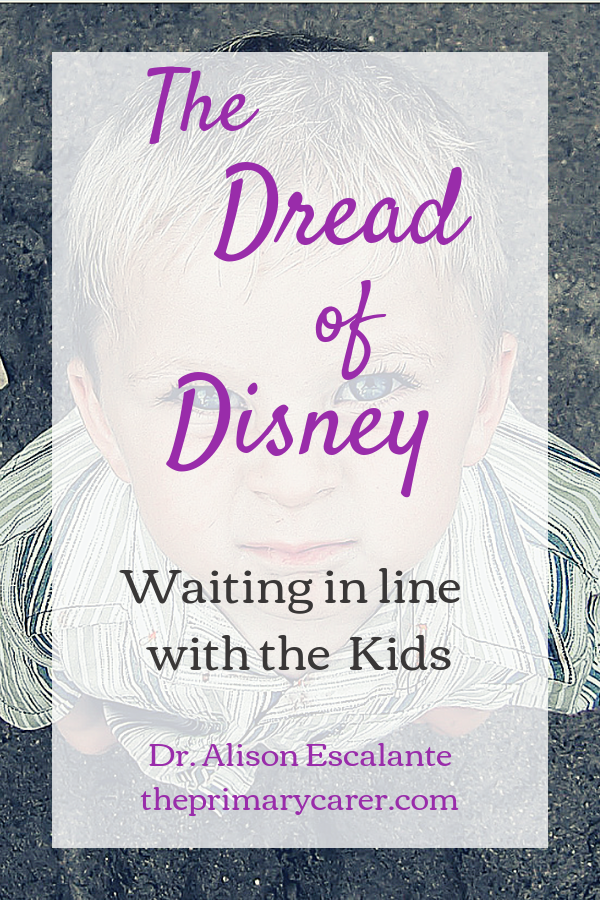Waiting in Lines on Family Vacation
Despite hours of waiting at lines at Disney World, there is no way around it: Disney is one of my favorite family trips. That’s because Disney is just different. The grounds are clean, and so is the language people use. There are very few people pushing, you are surrounded by people who are generally reasonably happy and enjoying time with family.
At Disney adults are open and interested in interacting with children. My kids strike up long conversations on the bus from the hotel to the park with the grown-ups near them. I love seeing this extroverted side of my children as they use this opportunity to develop skills in conversation. Most of all, I love my kids being in a place where there is a sense of community among strangers. We are all there for the same reason: to enjoy that Disney magic and connect with the people we care about.
But a vacation to Disney has a dark side: the dreaded waiting in lines.
I recall that the book Bringing up Bebé reported that French parents actually give their children opportunities to wait. They set up practice scenarios during which their kids are forced to wait. I don’t know a better time to practice waiting then whiles waiting in lines at Disney World.
Because our family flies, our whole first day is waiting. We drive to the airport, we wait at the airport, the flight feels like waiting to get to our destination, we wait for our luggage, we wait for our transportation, we wait to get into our room, we wait for our dinner. At home our kids are surrounded by their toys, but on vacation they have a couple books and some crayons.
When I was their age we used to go to a cabin in the state forest. The only waiting was Dad packing the car and the one hour drive, which felt like a long time to me. When we got to the cabin, we were there. My parents unpacked, but we immediately began catching frogs.
But for my kids the next step is the park day. More waiting. We wait for the bus from the hotel to the park. We wait at the bag inspection line, then we stand and wait to be allowed into the park. Once we get in there will be long lines for rides, or for food, or times of waiting between our plans. It’s Disney, so there are lots of interesting things to look at and ways to stay entertained. But when I was a kid my vacations did not involve much standing in line.
I would not say waiting is easy with my younger son, but he is so imaginative he tends to disappear into his imagination. Before I know it he’ll be acting out a character and my biggest issue is to keep him from bumping into me. Most of the time, he has the ability to turn waits into something interesting for himself.
Here’s the flip side: he does the same thing at school when he is bored. His teacher would prefer he pay attention to the lesson rather than daydream. I am fascinated by the way a strength in one context is a challenge in another.
My older son is simply no fun when waiting. At school, he pays attention to the lesson almost all of the time. While waiting, he looks to us to entertain him. He asks us to pull out our phones or play a game with him, but we can’t always come up with something. At this point he becomes generally annoying.

From a developmental perspective this is actually adaptive behavior. He is finding a way to tolerate boredom by creating some interest. Of course, I think it’s super frustrating that his way of dealing with boredom is to annoy me until I snap at him. But when a kid can’t find a way to deal with boredom in a positive way, they will create negative drama and attention. So what could I do with his intense creative energy?
It took me until the end of the vacation to figure it out. My older son loves challenges.
I figured it out with the 3 Steps
The next time I felt like snapping at my son, I SIGHED. Goodness I was feeling frustrated! I was NOT SURE what to do and I felt my shoulders and my face were tense. I SIGHED again and reassured myself. Then I tried to SEE my son. I recognized how increasingly frustrated he was, but I also recognized his strengths.
So I STARTED by giving him a task. I turned to him and said, “I challenge you to turn boredom into a challenge. You are really good at challenges. The truth is you are responsible for yourself during periods that are boring. You are responsible to find a way to deal with it without annoying and upsetting everyone around you. I challenge you to make your boredom into a challenge.”
Why did that work?
During my SEE step I recalled something important about my son. If I suggested anything specific he could do with the boredom, he would pick it apart and tell my why it wouldn’t work. I really wanted to make those specific suggestions. I wanted to tell him to try making up a story in his head or reading signs and making jokes out of them. But I didn’t. I did something much harder and trusted his strengths: that he could use his creativity to rise to the occasion.
The 3 steps are about identifying your own leadership, doing what you can to understand your own children, and then trying different things until you find something that works. And when that stops working you can do another 4S process. When we use the 3S’s we engage with our own feelings, and that makes it easier for us to engage with our kids feelings. And when our kids feel heard, they are more likely to engage with our expectations.
Did you notice I did not make specific suggestions about what you can have your own kids do while waiting? There are lots of books and blogs with tips and tricks about that. But I hope we can do something much harder: trust our strengths and develop our parenting leadership. I believe we can use our creativity to know our kids and rise to the occasion.
For more exciting adventures on family vacation, check out Mission NASA. Wonder what Should-Free Parenting might be like? Explore it with us in the facebook group.
Disclaimer: This article represents general education and does not constitute medical advice. My ideas are mine alone.


